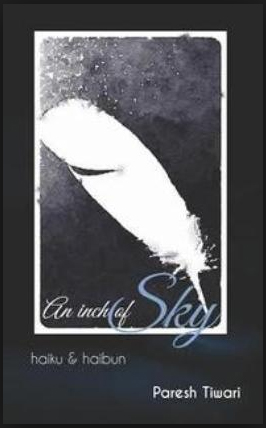Bob Lucky
Review of Paresh Tiwari's An Inch of Sky
(20 Notebooks Press, 2014)
 Paresh Tiwari began writing Japanese short form poetry and haibun in 2012. Since then he has become a regular contributor to many of the journals specializing in these forms. In An inch of Sky, his first book, he has gathered several of these published pieces and a few unpublished pieces. About half of the book is haiku; less than half is haibun. The rest, about 17% of the book, is comprised of forward, introduction, biography, and 13 pages of testimonials. I would like to have seen more haiku for Tiwari can write some exceptional haiku. Paresh Tiwari began writing Japanese short form poetry and haibun in 2012. Since then he has become a regular contributor to many of the journals specializing in these forms. In An inch of Sky, his first book, he has gathered several of these published pieces and a few unpublished pieces. About half of the book is haiku; less than half is haibun. The rest, about 17% of the book, is comprised of forward, introduction, biography, and 13 pages of testimonials. I would like to have seen more haiku for Tiwari can write some exceptional haiku.
My focus here is on the 25 haibun. Like many haibun writers, Tiwari is part memoirist and part confessional poet. Although in literature classes we're taught not to conflate the narrator/speaker with the author, it is a default mode when reading much of the haibun literature. In that light, Tiwari is a fearlessly open, writing of a visit to a prostitute in "Self Portrait," a rape in "Didn't it Rain?" and a couple exploring, literally, the effects of time on the body in "Anatomy."
"Didn't it Rain?" is one of my favorites in this collection and an example of Tiwari at his best (though the editor in me would love to cut the last prose block). It's understated, indirect, and the haiku caps the prose with a palpable poignancy.
Didn't it Rain?
She places a hand over her bare belly and peers into the full length mirror. It isn't swollen yet, but she can feel the fetus growing inside her.
For as long as she can remember, she has avoided looking too deep or for too long into a mirror – afraid of what she might find looking back at her. But there was a time when a new bindi, mismatched glass bangles, a hand-me-down dress, or a line of kohl were all reasons to admire her dusky beauty – capricious and flighty, the first signs of adolescence, slipping in unseen by most, except lascivious uncles. It has been twelve years since that evening …
She moves the pastel curtains to a side and lets the pale sun spill in; outside a potted hibiscus buds again.
music box –
the ballerina held up
by Band-Aids
The link and shift between prose and haiku in haibun may be comparable to the volta in a sonnet. You can have unmetered, unrhymed, 13-line, 15-line, prose poem sonnets, but you can't really call them sonnets unless there's a volta lurking in there. Even with something as minimal and repetitive as Ron Padgett's "Nothing in That Drawer," people who claim it's a sonnet read it as if there is a volta in it. No mean feat. Without the link and shift, there's not really a haibun. Tiwari has a keen sense of link and shift even when the prose isn't deserving of the haiku. That's where a few of his haibun stumble.
Some, like "Journeys," are overwritten and border on melodrama, but the major weakness in the prose is reliance on vignette and on the sense that the factual truth matters in literature, that adherence to 'the way it was' makes a piece of prose universal: it happened to me; therefore, people can relate. This is a common problem with many haibun (and I'm as guilty as most). But to be literature, the prose in a haibun needs something literary – the arc, no matter how slight, of a narrative, the lyricism of poetry. Vignettes in isolation, even with a well-linked haiku, do not have this. For example, in "Ooroo," the speaker is befriended by a stray dog that "gaze[s] soulfully" until he melts and gives her a packet of biscuits. In "Awakening," the speaker comments on the weather outside and how he is cooped up in a meeting. Can most of us relate? Of course. But So what? as David Cobb might ask.
In those haibun, and there are several, where Tiwari's prose shows the speaker or protagonist undergoing some change or experiencing some sort of epiphany, the reader has a literary experience. In "The Last Sliver of Sky," for example, Tiwari indulges in memoir (I assume), but it ends with the emergence of a favorite memory of visiting his grandmother, which in turn illuminates the other memories related to that experience. Another haibun that works similarly is "Orbits." When the prose is on, Tiwari writes some good haibun. I look forward to reading more of them.
|

